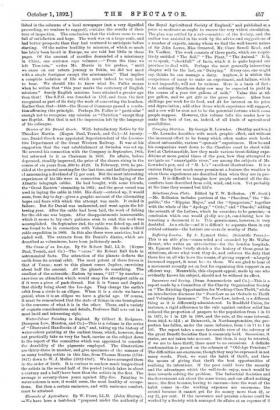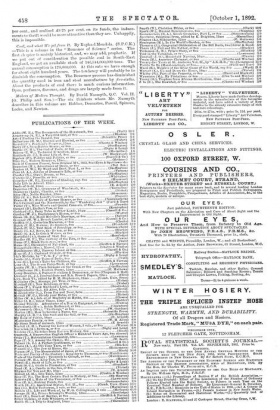Insurance and Saving. (Swan Sonnenschein and Co.)—This is a report
made by a Committee of the Charity Organisation Society on "The Existing Opportunities for Working-Class Thrift," while an introduction discusses the " Poor-Law as an Obstacle to Thrift and Voluntary Insurance." The Poor-Law, indeed, is a different thing as it is differently administered. In Bradfield Union, for instance, a rigid adherence to the rule against outdoor relief has reduced the proportion of paupers to the population from 1 in 13 in 1871, to 1 in 126 in 1888, and the rate, at the same interval, from 241d. to ad.; at Brixworth, in Northamptonshire, the pro- portion has fallen, under the same influence, from 1 in 11 to 1 in 101. The report takes a more favourable view of the solvency of the great Benefit Societies than is commonly held. Secessions, it states, are not taken into account. But then, it may be retorted, if we are to have thrift, there must be no secessions. A definite condemnation is passed on the schemes of " Old-Age Pensions." The difficulties are enormous, though they may be expressed in not many words. First, we want the habit of thrift, and then the means of giving that thrift the best opportunities of realising its intentions. If the poor could have the security and the advantages which the well-to-do enjoy, much would be done towards solving the problem. The Industrial Societies and the Government ask about the same terms, and can afford nothing more ; the first because, having to canvass—here the want of the habit comes in—the working expenses are enormous ; the second because it cannot get for its money more than 2/, or say 21, per cent. If the insurance and pension scheme could be worked by a Society which managed its affairs at an expense of 6
per cent., and realised X4.25 per cent, on its funds, the induce- ments to thrift would be more attractive than they are. Unhappily, this is impossible.



































 Previous page
Previous page